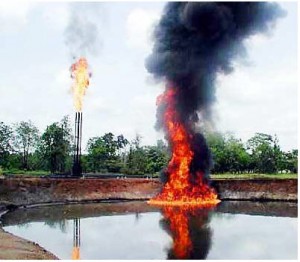For decades, international environmentalists have been decrying the deforestation of the Amazon basin as the most amoral act by man against nature in world history. But, from the unsuspecting native tribes that welcomed Spanish explorers centuries ago to national governments that conspired with multinational corporations in modern times, indigenous people of the Amazon have always allowed foreigners to reign over their rainforest like foxes in a henhouse.
Today, however, native Indians are fighting to prevent further exploitation of Amazon lands. And nowhere is this fight more organized and violent than in the tiny country of Ecuador. Indeed, only last week, Indians from the Kichwa, Achuar and Shuar tribes staged widespread protests that brought much of Ecuador’s industrial activity to a screeching halt.
 In the 1990s, Ecuador became the mecca for oil exploration in Latin America. The country’s Ministry of Energy and Mines sparked a black gold rush in 1999 when it confirmed Ecuador’s potential to yield as many as 26 billion barrels in oil reserves. And, with the recent completion of a 300-mile pipeline, Ecuador is now capable of producing up to 850,000 barrels a day (an amount which ranks it among the largest producers of oil in Latin America).
In the 1990s, Ecuador became the mecca for oil exploration in Latin America. The country’s Ministry of Energy and Mines sparked a black gold rush in 1999 when it confirmed Ecuador’s potential to yield as many as 26 billion barrels in oil reserves. And, with the recent completion of a 300-mile pipeline, Ecuador is now capable of producing up to 850,000 barrels a day (an amount which ranks it among the largest producers of oil in Latin America).
Understandably, Ecuadorian officials remain extremely solicitous of milking their new cash cow for all it’s worth. Yet, these are not entirely mercurial leaders. Because the dirty little secret that binds all of the oil producing countries throughout this region is their onerous debt burden to international creditors, like the International Monetary Fund (IMF). And, like all of these countries, Ecuador labors under extreme duress to service its debt; and, expanding oil production deep into the Amazon rainforest promises tremendous relief in this regard.
Notwithstanding foreign obligations and potential riches, however, the Indians have had enough! They have asserted ancestral land rights to areas of Ecuador where the potential yield for oil is greatest. And, to protect their rights and drive away the oil companies, they have organized guerilla campaigns of kidnappings, sabotages and robberies that would make the insurgents in Iraq green with envy.
In addition, however, the Indians have joined forces with environmental groups like Amazon Watch to fight the oil giants in more sophisticated ways. To this end, they have staged city protests, filed legal injunctions and sued the companies for pollution, dumping waste into waterways and leaving behind hundreds of unlined pits brimming with toxic wastewater – which the Indians claim have caused irreparable harm to their health. In fact, a $6 billion class action lawsuit by Indian tribes have oil giant ChevronTexaco so tied up that the wariness of other oil companies is bringing oil production in Ecuador to a virtual standstill.
It is worth noting, however, that the Amazon Indians insist that no amount of money will settle their land claims. In this respect, they differ from their North American brothers who have greedily parlayed ancestral land rights into pleasure domes of gambling, drinking and exotic sex.
Nevertheless, some multinationals have tried to be good corporate citizens by funding clinics, schools and other modern amenities. And, they have pressured the government to channel more of their oil revenues to poor villages where over 75% of the Ecuadorian population reside. But the Indians now seem as fanatical to drive the oil companies from their ancestral land as bin Laden jihadists were to get the American military out of their holy land.
Meanwhile, Ecuador’s president, Lucio Gutiérrez, is threatening military action to arrest the Indians from their “primordial” fixation. But, given the worldwide publicity already attending the ChevronTexaco trial, the oil barons have thus far persuaded Gutiérrez that such action would incite so much international outrage that the little fortune they now enjoy would dry up overnight.
 Burning hazardous oil pits like this one abandoned by ChevronTexaco have provoked unrelenting outrage amongst native indians
Burning hazardous oil pits like this one abandoned by ChevronTexaco have provoked unrelenting outrage amongst native indians
Indeed, it is an ironic coup that the Indians are using modern technology to dramatize their david against goliath fight to preserve their primitive way of life. Nevertheless, the looming spectre of violence and more law suits are paralyzing Ecuador’s oil industry.
The repercussions from this fight, however, threaten to disrupt oil production throughout the Amazon basin – as Indians, especially in Brazil, Bolivia Columbia and Venezuela, feel empowered to assert similar rights. Moreover, this portends serious consequences for America’s political quest to reduce its dependency on oil from the Middle East. Indeed, it may even have made last week’s vote in the US Senate to allow oil drilling in Alaska’s Arctic National Wildlife Refuge (ANWR) a little more palatable.
It is a little known fact that the U.S. imports more oil from Latin America than it does from the Middle East. And, with China now pushing for increased oil supplies from this region, Latin American governments may feel compelled to take drastic and decisive action to ensure uninterrupted production of oil.
But, there are almost 40 million Indians living in the Amazon basin. And, it is clear that a significant number of them have become so disillusioned with capitalism that they are determined to protect the rainforest, not as an environmental cause, but as a matter of life or death.
Unfortunately, history and the inexorable force of human progress put the Indians at a considerable disadvantage in this fight. And, it is regrettable that our addiction to oil will allow us to ignore whatever Latin American governments do to the native Indians to ensure our life sustaining fix.
Be encouraged, however, because God must be on the side of the Indians…
s reid says
why cant they leave the indians alone they are good peaple i have allways respected there ways